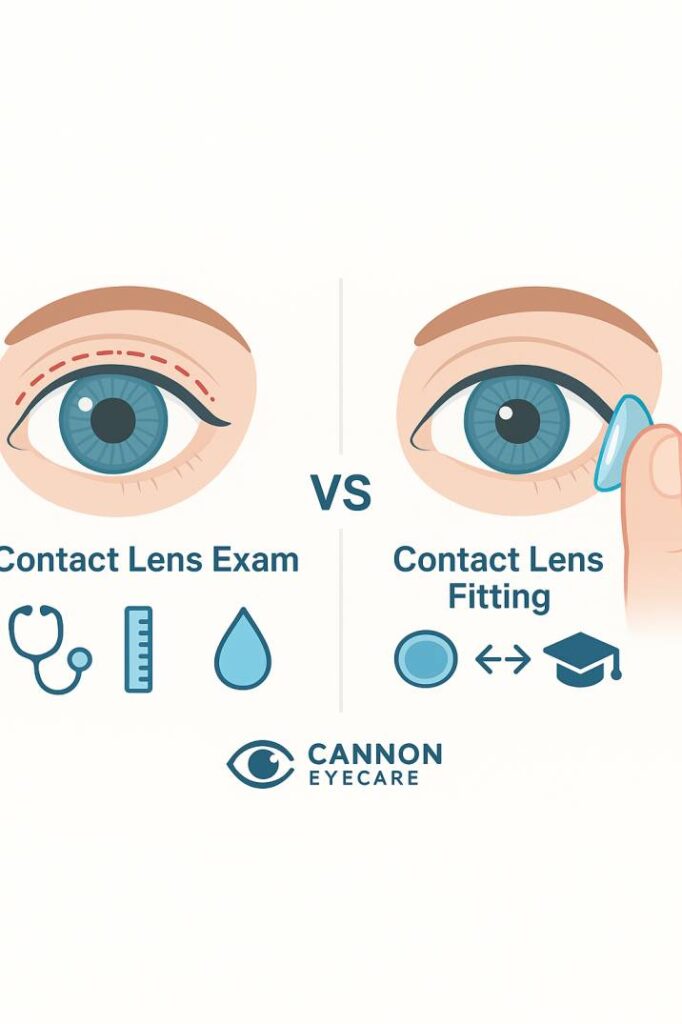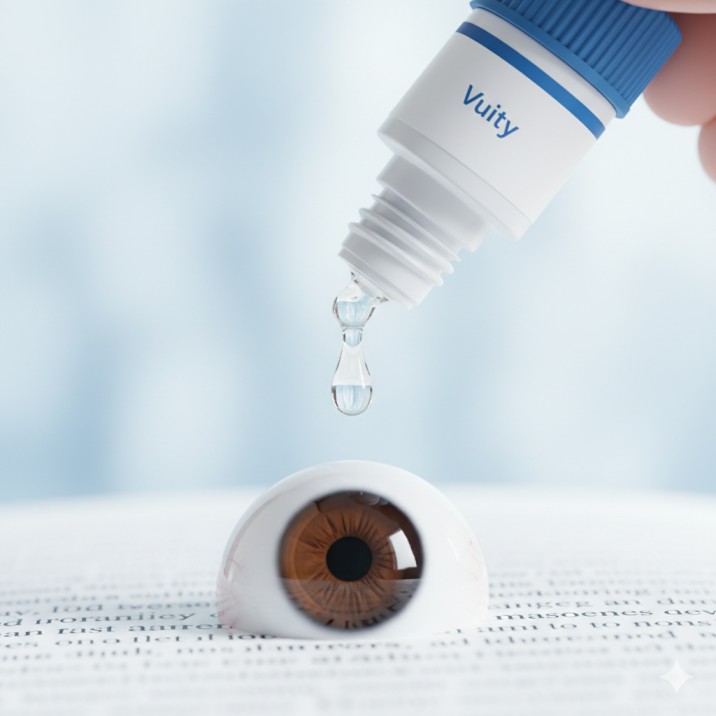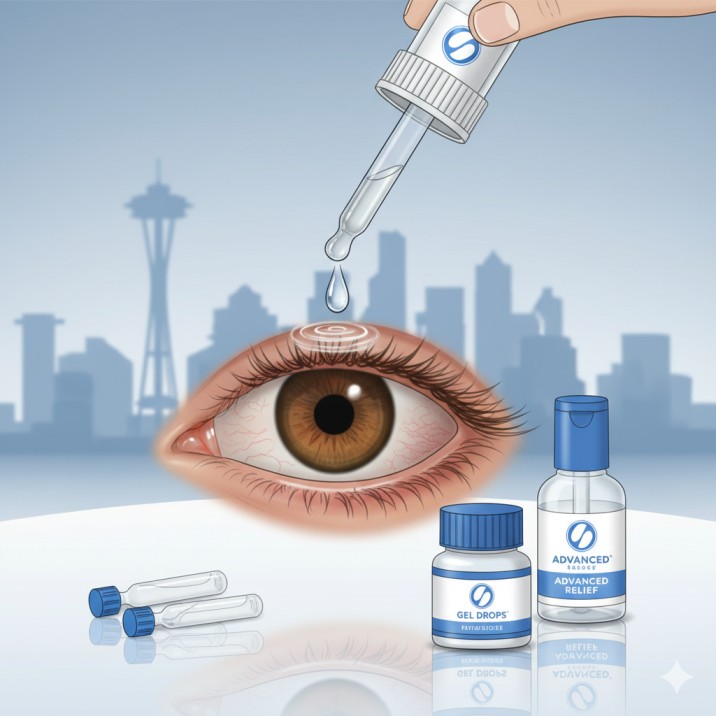Contact Lens Exam vs Fitting: Key Differences | Cannon EyeCare
The Essential Guide to Proper Contact Lens Care in Seattle
Bottom Line Up Front: A contact lens exam is a comprehensive evaluation that includes vision testing, eye health assessment, and specific measurements for contact lens wear, while a contact lens fitting is the hands-on process of selecting, placing, and adjusting trial lenses on your eyes. Both are essential steps that often occur during the same appointment for optimal vision correction and eye health.
When considering the switch from glasses to contact lenses—or if you’re already a contact lens wearer needing to update your prescription—understanding the distinction between a contact lens exam and a contact lens fitting can save you time, money, and ensure you receive the proper care your eyes deserve. At Cannon EyeCare in Seattle, our expert team provides both comprehensive contact lens exams and precise contact lens fittings, ensuring every patient receives personalized attention throughout their contact lens journey.
Understanding Contact Lens Examinations
A contact lens exam is a specialized eye examination that goes beyond standard vision screening to evaluate your eyes’ suitability for contact lens wear. During this comprehensive evaluation, your doctor determines the best type and brand of lenses for your specific needs while measuring crucial aspects of your eyes, such as corneal curvature, to ensure proper lens fit.
Essential Components of a Contact Lens Exam
1. Comprehensive Eye Health Assessment
Your contact lens exam begins with a thorough evaluation of your overall ocular health. This comprehensive approach includes testing your visual acuity, depth perception, and peripheral vision, along with an eye pressure test for glaucoma screening. This foundational assessment ensures that any underlying eye conditions are identified and addressed before contact lens wear begins.
2. Specialized Vision Testing
Unlike standard eye examinations, contact lens evaluations include specialized vision tests tailored specifically for contact lens wear. The optometrist carefully evaluates the size and shape of your eye to determine the optimal lens fit. These precise measurements are crucial because contact lenses sit directly on your eye’s surface, requiring specifications that differ significantly from traditional eyeglasses.
3. Advanced Corneal Measurements and Mapping
Using sophisticated instruments such as a keratometer, your optometrist measures the curvature of your cornea with remarkable precision. This measurement helps determine the base curve of your contact lens, which appears on your prescription as “BC” (base curve). For patients with irregular corneal surfaces or complex prescriptions, advanced corneal topography may be performed to create a detailed, three-dimensional map of your eye’s unique contours.
4. Comprehensive Tear Film Evaluation
Eyes prone to dryness often experience greater difficulty with contact lens wear. Therefore, your optometrist may employ advanced microscopic techniques, specialized dyes, or comprehensive tear film tests to examine the natural moisture that lubricates your eye’s surface. This detailed evaluation helps determine which contact lens materials and designs will provide optimal comfort for your specific tear composition and lifestyle needs.
The Art and Science of Contact Lens Fitting
A contact lens fitting represents the hands-on, practical application of the measurements and assessments gathered during your examination. This critical process involves your eye care professional selecting trial lenses and meticulously evaluating how they perform on your unique eye anatomy. The contact lens fitting allows your optometrist to observe how a particular contact lens functions and fits your eye during actual wear.
The Comprehensive Contact Lens Fitting Process
1. Precision Trial Lens Placement
During the fitting phase, your optometrist strategically places diagnostic contact lenses on your eyes based on the precise measurements obtained during your examination. Following placement, your eye doctor performs another detailed slit lamp examination to assess whether the lenses fit properly and function optimally. Finally, comprehensive visual acuity testing determines how effectively the contact lens corrects your vision.
2. Dynamic Movement and Comfort Assessment
Your optometrist then examines your eyes through a high-powered slit lamp microscope to evaluate proper lens movement and centration. Simultaneously, they conduct visual acuity testing while you’re wearing the contacts to assess their performance. Proper lens movement is essential for maintaining eye health, as it allows fresh tears to circulate beneath the lens and prevents complications.
3. Strategic Brand and Material Selection
Your eye care professional systematically evaluates different lens brands and materials to identify the optimal combination for your lifestyle and unique eye physiology. This process considers your specific needs—whether you require daily disposables versus reusable lenses, specialized lenses for astigmatism correction, or multifocal options for presbyopia—ensuring your eye doctor selects the most appropriate solution based on your lifestyle and prescription requirements.
4. Comprehensive Education and Training
For first-time contact lens wearers, the fitting process includes extensive instruction on proper lens insertion, removal, and maintenance protocols. Upon completion of your contact lens fitting, if you’re new to contact lens wear, your doctor provides thorough training on how to safely insert, remove, and properly disinfect your lenses, ensuring your long-term success and eye health.
Distinguished Differences: Contact Lens Exam vs. Contact Lens Fitting
Understanding the nuanced differences between these two essential components of contact lens care empowers patients to make informed decisions about their eye health and vision correction needs.
Scope and Clinical Purpose
Contact Lens Examination Focus:
- Comprehensive eye health evaluation and disease screening
- Precise vision prescription determination through advanced refraction
- Detailed corneal measurements and topographic mapping
- Thorough tear film assessment for optimal lens selection
- Clinical candidacy evaluation for safe contact lens wear
Contact Lens Fitting Focus:
- Strategic trial lens selection and placement based on examination findings
- Dynamic lens movement and comfort evaluation during actual wear
- Systematic brand and material optimization for individual needs
- Comprehensive visual performance assessment with lenses in place
- Detailed patient education on proper lens care and handling
Professional Time Investment and Scheduling
The excellent news for patients is that most contact lens fittings can be seamlessly combined with your comprehensive eye examination, typically adding only 10-15 minutes to your appointment. However, first-time wearers or those requiring multifocal contacts may need additional time for proper instruction and adjustment. Complex prescriptions or specialty lens requirements may necessitate additional appointments and follow-up care.
Investment in Professional Eye Care
Contact lens examinations include specialized testing and precise measurements that go beyond routine eye examinations, reflecting the additional expertise and time required for proper contact lens evaluation and fitting. In Seattle, comprehensive contact lens exams typically range from $120-$345, with basic eye examinations starting at $190-$225 for patients without insurance coverage.
The Critical Importance of Comprehensive Contact Lens Care
Protecting Your Vision and Eye Health
Improperly fitted contact lenses can lead to a cascade of serious complications, including blurred vision, chronic eye strain, persistent headaches, ocular redness, severe dry eye syndrome, and potentially sight-threatening infections. The synergistic combination of thorough examination and precise fitting works collaboratively to prevent these complications while ensuring optimal long-term eye health and visual performance.
Optimizing Vision Quality and Daily Comfort
The strategic combination of comprehensive examination and precision fitting ensures optimal vision correction and sustained comfort throughout your daily activities. A contact lens exam concentrates specifically on the specialized measures and assessments essential for successful contact lens wear, distinguishing it from regular eye examinations that focus primarily on general eye health and basic vision correction.
Establishing Long-term Visual Success
Proper examination and fitting protocols establish the critical foundation for successful long-term contact lens wear. Regular follow-up examinations and periodic refittings help maintain optimal eye health, ensure continued comfort, and preserve superior vision quality throughout your contact lens-wearing years.
Specialized Contact Lens Options at Cannon EyeCare
Comprehensive Contact Lens Fitting Services
At Cannon EyeCare, we offer a full range of contact lens options to meet diverse vision needs and lifestyles. Our comprehensive contact lens exam and contact lens fitting services ensure optimal outcomes for every patient:
Daily Disposable Lenses are Perfect for occasional wear, sports, or those who prefer the convenience of fresh lenses every day without cleaning solutions.
Extended Wear Options For patients who prefer longer-wearing schedules, we provide carefully selected options with thorough follow-up care.
Specialty Lenses, including toric lenses for astigmatism correction and multifocal lenses for presbyopia management.
Advanced Technology and Expertise
Our Seattle practice utilizes state-of-the-art diagnostic equipment to ensure precise measurements and optimal contact lens fitting outcomes. Cannon EyeCare in Seattle, WA, provides thorough contact lens exams and contact lens fittings. Call (206) 448-7739 to schedule. We serve Seattle Metro and prioritize patient-specific solutions for clear, comfortable vision.
Excellence in Contact Lens Care: The Cannon EyeCare Advantage
Personalized Contact Lens Fitting Experience
At Cannon EyeCare, our approach seamlessly integrates advanced medical expertise with genuine personal connection and care. We invest considerable time in understanding your unique lifestyle, work environment, and specific vision goals to recommend the most suitable contact lens solutions through our comprehensive contact lens examination and precision contact lens fitting processes.
Comprehensive Long-term Care and Follow-up
Contact lens prescriptions maintain validity for only one year and require annual evaluation for renewal, regardless of prescription changes. This regulatory requirement ensures that lenses continue fitting properly, allows for necessary adjustments, and most importantly, protects your precious vision and eye health throughout your contact lens journey.
Insurance Coverage and Financial Accessibility
Cannon EyeCare proudly accepts major health insurance plans, including Premera, Regence, Medicare, Lifewise, HMA, and Kaiser Permanente PPO, though we do not participate with VSP, EyeMed, or Davis Vision due to restrictive contractual limitations. For patients paying out-of-pocket, comprehensive eye examinations cost $225, with contact lens fittings ranging from $110-$160 depending on lens complexity (spherical, toric, or multifocal options).
Authentic Patient Success Stories
“Dr. Cannon provided the most thorough contact lens fitting I’ve ever experienced. The detailed explanation of each step and genuinely personalized attention made all the difference in my comfort and vision quality.”
— Seattle Patient Review
“After struggling with persistent contact lens discomfort for years, Cannon EyeCare’s comprehensive approach finally identified the perfect lens solution for my challenging dry eye condition.”
— University Village Patient
“The exceptional team at Cannon EyeCare took considerable time to understand my active outdoor lifestyle and recommended daily disposables that work perfectly for my hiking and cycling activities around the Pacific Northwest.”
— Capitol Hill Patient
Professional Contact Lens Examination and Fitting Protocol
Pre-Appointment Preparation Guidelines
Essential Items to Bring:
- Current eyeglasses or contact lenses for comparison and assessment
- Complete insurance cards (both health and vision coverage)
- Comprehensive list of current medications and supplements
- Specific questions about your vision goals and lifestyle requirements
Time Investment for Optimal Care
Please allow approximately 60-90 minutes for a comprehensive contact lens examination and contact lens fitting at Cannon EyeCare, particularly if you’re a first-time contact lens wearer requiring extensive education and training.
The Professional Contact Lens Care Process
Initial Consultation and Assessment (15 minutes)
Every contact lens examination at Cannon EyeCare begins with an in-depth consultation where your optometrist carefully reviews your medical history, lifestyle factors, and specific vision needs. This comprehensive discussion enables us to determine the most appropriate lens options tailored to your individual requirements and daily activities.
Advanced Comprehensive Testing (30-45 minutes)
Your contact lens examination encompasses all standard eye health assessments plus specialized measurements and evaluations specifically designed for optimal contact lens fitting and long-term success.
Professional Trial Fitting and Education (15-30 minutes)
Following your contact lens fitting with carefully selected trial lenses, you’ll receive comprehensive instruction on proper lens care protocols, insertion and removal techniques, and essential maintenance practices for optimal eye health.
Comprehensive Eye Care Services at Cannon EyeCare
For complete eye care extending beyond contact lens services, we invite you to explore these related professional offerings:
- Comprehensive Eye Examinations: Annual vision assessments and complete eye health evaluations
- Advanced Dry Eye Treatment: Specialized therapeutic care for contact lens-related dry eye symptoms and conditions
- Specialty Contact Lens Fitting: Advanced options for astigmatism correction, presbyopia management, and complex prescriptions
- Emergency Eye Care Services: Urgent care for contact lens complications and acute eye health concerns
Recent Advances in Contact Lens Technology
2024-2025 Industry Trends
In 2024, data for 100 contact lens fits or more were received for 19 markets globally, with 10,716 fits analyzed across the included markets. Daily disposable contact lenses have surged in popularity due to their convenience, hygiene benefits, and reduced risk of eye infections. These advances provide more options for patients with varying needs and preferences.
Silicone Hydrogel Materials
In 2024, silicone hydrogel (SiHy) lenses reportedly were used for 64% of fits, while hydrogels reportedly were used in 15% of fits, and gas-permeable lenses in 13% of fits. Silicone hydrogel materials are adopted in 78% of contact lens fittings globally, with this ratio reaching 83% for frequent replacement contact lenses. These advanced materials offer improved oxygen transmission and comfort.
Specialty Lens Growth
When asked which popular specialty lenses had the greatest growth potential in 2025, most practitioners indicated scleral lenses (46% versus 32% for 2024), followed by custom soft lenses (25% versus 25% for 2024).
Additional Resources and Citations
For readers seeking additional information about contact lens exams, contact lens fittings, and current industry standards, the following authoritative sources provide comprehensive data and research findings referenced in this article:
1. Contact Lens Spectrum – International Contact Lens Prescribing Survey 2024
Contact Lens Spectrum International Survey. This comprehensive annual survey analyzed 10,716 contact lens fits across 19 global markets, providing current data on silicone hydrogel adoption rates (78% of fittings), daily disposable trends (40% of fits), and specialty lens growth patterns cited throughout our article.
2. Washington State Department of Health – Contact Lens Regulations
Washington State Contact Lens Laws Official regulatory documentation outlining Washington state requirements for contact lens prescriptions, including the mandatory 6-month fitting completion timeframe and “OK for contacts” prescription notation requirements discussed in our legal compliance sections.
3. International Trends in Silicone Hydrogel Contact Lens Prescribing Research
ScienceDirect – Silicone Hydrogel Trends Study Peer-reviewed research analyzing 260,144 daily wear soft contact lens fits across 20 countries from 2000-2023, documenting the dramatic increase in silicone hydrogel usage from 2.8% to 73.7% and supporting our discussion of modern contact lens material advances.
These resources provide evidence-based information for healthcare professionals and patients seeking to understand current contact lens fitting practices, regulatory requirements, and technological developments in the field.
Conclusion: Your Journey to Clear, Comfortable Vision
Understanding the fundamental differences between contact lens examinations and contact lens fittings empowers you to make informed, educated decisions about your comprehensive eye care. Both components are essential for safe, comfortable, and highly effective contact lens wear. At Cannon EyeCare, our experienced and dedicated team seamlessly combines comprehensive contact lens examination techniques with precision contact lens fitting protocols to ensure optimal outcomes for every patient we serve.
Whether you’re considering contact lenses for the first time or seeking to enhance your current contact lens experience, our Seattle practice provides the advanced expertise and genuinely personalized attention you deserve. We invite you to schedule your comprehensive contact lens consultation at Cannon EyeCare today to experience our distinctive approach—where authentic Midwestern hospitality meets cutting-edge eye care expertise.
Ready to experience the freedom and convenience of contact lenses? Contact Cannon EyeCare at (206) 448-7739 to schedule your comprehensive contact lens examination and precision contact lens fitting. Conveniently located in University Village, we’re here to help you see clearly and comfortably while maintaining optimal eye health.
FAQs
-
A contact lens exam checks your eye health and vision needs, while a fitting measures your eye’s shape to ensure contacts fit comfortably and safely
-
Fittings make sure your lenses’ size and shape still match your eyes, providing comfort and reducing risks, especially if your eye shape changes over time
-
Contact lens prescriptions need extra measurements like corneal curvature and lens fit; glasses prescriptions only need vision correction details
-
No, you need a specific contact lens fitting to ensure your lenses fit safely and match your prescription needs, beyond a standard eye exam
-
Your eye doctor measures your eye’s surface, checks tear quality, and lets you try different lenses for comfort and vision clarity
-
Most doctors recommend a yearly contact lens exam and fitting to monitor eye health and update your prescription if needed
-
Yes, because fittings involve additional expertise, measurements, and sometimes trial lenses beyond the standard eye exam
-
Some plans cover contact lens exams, but fittings often carry an extra fee. Always check with your provider first
-
Yes, annual fittings check for eye changes and ensure ongoing lens safety, even if you have no discomfort
-
No, a fitting is usually required to finalize and release your updated contact lens prescription
-
Yes, switching lens brands or types usually requires a new fitting for optimal comfort and safety




